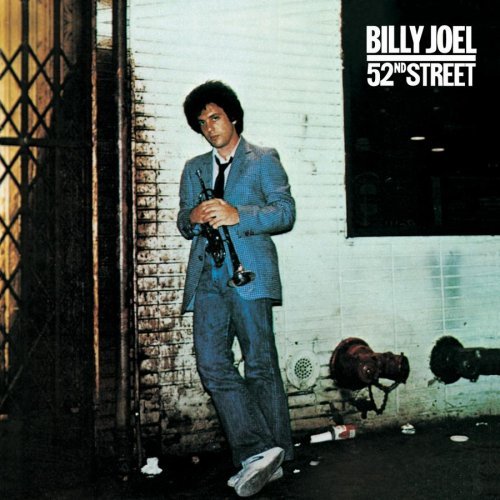
52nd Street (1978)

1. Big Shot
2. Honesty
3. My Life
4. Zanzibar
5. Stiletto
6. Rosalinda's Eyes
7. Half a Mile Away
8. Until the Night
9. 52nd Street
52nd Street, released in 1978, served as both a commercial affirmation and an artistic expansion of the groundwork laid by The Stranger. Rather than replicate the previous album’s format or thematic cohesion, Billy Joel pursued a broader, more eclectic approach—one that allowed him to explore an array of genres with a surprising degree of fluency. The result is a record that is stylistically diverse yet remarkably cohesive, balancing sharp lyrical commentary with polished, jazz-inflected arrangements.
The album opens with Big Shot, a caustic takedown of social pretension delivered with venom and swagger. It sets a misleading tone—suggesting a record of urban grit and personal vitriol—but the album quickly reveals a wider emotional and tonal range. Stiletto, another emotionally charged track, explores mutual manipulation within a toxic relationship, its dramatic arc underscored by a taut arrangement and Joel’s increasingly nuanced vocal delivery.
Beyond these darker character studies, the album embraces musical experimentation with open arms. Zanzibar stands out as one of Joel’s most ambitious and successful fusions—melding rock’s assertiveness with the sophistication of jazz, complete with a commanding trumpet solo. Rosalinda’s Eyes, a delicate and lyrically affectionate piece, incorporates Latin textures and melodic phrasing, while Until the Night channels the influence of Phil Spector’s wall-of-sound into a soaring, orchestrated ballad. Though rarely performed live, the latter track is among the album’s most compositionally rich moments.
Even the album’s commercial hits bear the mark of careful construction. My Life, the most radio-friendly cut, has been criticized by Joel himself for sounding dated, but its craftsmanship and catchy vocal lines explain its wide appeal at the time. Honesty, with its sparse arrangement and plaintive tone, provides an effective contrast, showcasing Joel’s more vulnerable lyrical mode.
The album closes with its title track, 52nd Street, a brief, jazz-tinged coda that functions more as a thematic epilogue than a standalone song. Like Souvenir from Streetlife Serenade, the track reflects a subtle self-awareness, bringing the listener down gently after the album’s stylistic journey.
If The Stranger represented Joel’s breakthrough, 52nd Street confirmed his staying power. The record reflects an artist expanding his palette without sacrificing accessibility, embracing complexity without losing clarity. It also marks the beginning of a sustained period of commercial and creative success.
Joel had not only found his voice—he had learned to modulate it, bend it, and enrich it with every influence he could credibly absorb.
Back To Main Page
Go To Next Review